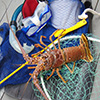General Fishing License FAQs
As an angler in the United States, you will need to obtain proper fishing credentials, along with additional endorsements, based on the state you plan to fish in. Below, we have addressed some Frequently Asked Questions regarding how to legally fish as a resident or as a visitor in the United States.
1. How do I get a fishing license?
The process to buy a fishing license varies from state to state. Typically, residents will be required to show proof of residency before they pay the resident fishing license fee. Nonresidents are simply asked to provide identification along with payment. For specific information, visit your state page.
2. How long will a license last?
The length of a fishing license's validity will depend on the credential that you purchase. States offer licenses that range from one day to one week. In addition, there are also annual fishing permits that last through the year, and lifetime licenses that are valid for the rest of a fisherman's life.
3. How much does a fishing license cost?
The price of a license to fish varies depending on a number of factors, including:
- How long you want your fishing license to be valid for (days, years, a lifetime).
- If you are applying for a single license or a couple's license.
- If you would like to purchase an additional permit to fish.
4. Does a license allow me to fish for any species of fish?
No, it does not. Certain species of fish, such as trout or salmon, require sportsmen to have specific fishing permits in order to take, kill or possess them legally.
5. What do I do if I just lost my fishing license?
In the event that your license has been misplaced, stolen or destroyed, it is your responsibility to obtain a new fishing license from your state's fisheries department. Most states will allow you to apply for a fishing license replacement online, in person or over the phone. In some cases, you may be issued a temporary ID number as you wait for a new fishing license to arrive.
6. Can I fish for free?
Free Fishing Days in different states occur several times during the year, typically on National Boating Week and National Fishing Week. On these days, buying a fishing license is not required to partake in the sport.
7. Can I get a free fishing license?
Depending on your state of residence, there are individuals who will be eligible to obtain fishing credentials free of charge. Groups that typically fall into this category include:
- Veterans with a 100 percent service-related disability.
- Foreign exchange students.
- Individuals with a developmental disability.
8. Do military members have to buy a fishing license?
Yes, in some instances. Many states allow military members stationed out of state to purchase a resident fishing license, even away from home. On the other hand, individuals who are home on leave oftentimes do not have to buy a fishing license in their home state. Furthermore, there are also instances in which permanent licenses can be issued. Veterans with 100 percent service-related disabilities, for instance, are often provided with permanent licenses to fish.
9. If I am permanently disabled, do I need to buy a license to fish?
The answer depends on where you live. Certain states will allow you to fish without credentials, while others will require you to buy a fishing license, just like other sportsmen. However, if you are a veteran with a completely service-related disability, you will more than likely be given a permanent fishing license by your fisheries department.
10. Do I need a saltwater or freshwater fishing license?
First of all, depending on your state, you may not have to worry about this dilemma. Certain states only have freshwater fishing; thus, you purchase a freshwater license. However, in states that offer both types of fishing, you will have to decide what types of fish you want to catch and find out what type of water they are located in. For clams, crabs and saltwater fish, a saltwater fishing license is necessary. For crappie and catfish, on the other hand, you must buy a freshwater fishing license. In states where both freshwater and saltwater fishing is abundant, you may also be able to apply for a combination fishing license, so you can enjoy angling in both waters.




